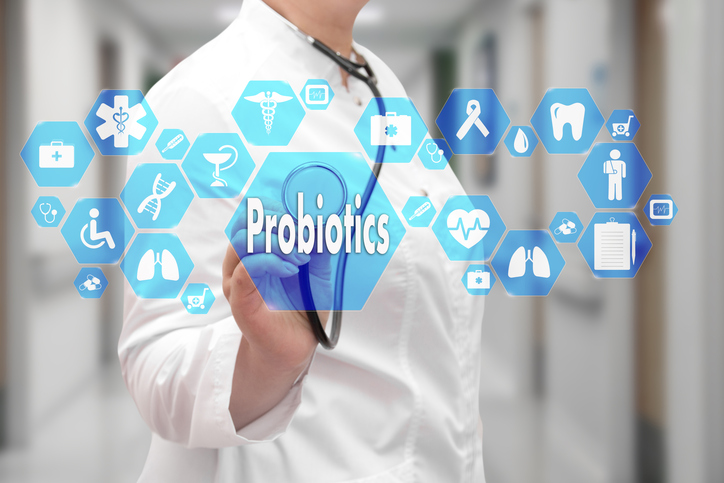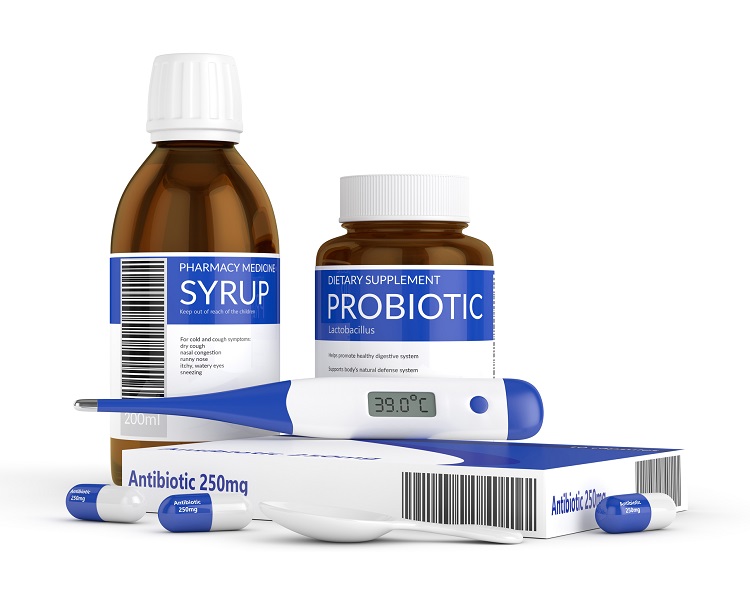- probiotik.sk - why take probiotics
Probiotics - bacteria needed for our health?

Until a few years ago, probiotics were not so much talked about. Now they are recommended for any antibiotic treatment, but also for various ailments or diseases.
Article content
- What are probiotics
- What is the gut microbiota and why should we take more care of it than in the past
- Functions of probiotics in our body
- What are the known probiotic strains
- Probiotics and pregnancy
- Risks and possible side effects
- Probiotics or prebiotics?
- How to take probiotics
- How to store probiotics properly
- Natural sources of beneficial bacteria - probiotics
What are probiotics
Probiotics are live microorganisms that are non-pathogenic. This means that they are not disease-causing. On the contrary, in sufficient quantities they are beneficial for the organism. In the host body, they adhere to the lining of the large intestine, thus preventing the deposition of harmful bacteria and their multiplication.
Probiotics are bacteria that inhibit the growth of harmful microorganisms by their presence.
Probiotics are in contact with the cells of the lymphatic system and thus make an important contribution to immunity. The lymphatic system removes, among other things, waste substances from the cells. These are trapped, together with foreign and harmful substances, in the lymph nodes, which are distributed throughout the body. This is an important part of the immune system.
You can also read more in the article.
If there are few probiotic bacteria, there is plenty of room for disease-causing bacteria to multiply. This makes it easy for disease to break out.
The name probiotic is Greek for bios - for life.
What is the gut microbiota and why should we take more care of it than in the past
The intestinal microflora is a collection of microorganisms in the large intestine, which, in the right composition, has a beneficial effect on our organism. Probiotics prevent the excessive multiplication of harmful bacteria and thus maintain the balance between these microorganisms.
The intestinal microflora is formed right from birth.
As the baby passes through the birth canal, the first colonisation of microbial strains begins.
Other beneficial bacteria that colonise the baby's gut are obtained through breast milk.
Today's times have brought more canned, artificial or chemically modified foods into our diets. These may have a longer shelf life, but they do not contain the natural microflora that provides natural protection for the body.
Excessive hygiene is also a factor that contributes to the disruption of the natural microflora. The frequent use of soaps or other cleaning products will rid our bodies of germs or harmful bacteria, but also of healthy, probiotic bacteria that are necessary for our health.
The increasing use of antibiotics is also leading to a disruption of the intestinal microflora. Antibiotic treatment is used for infectious diseases caused by bacteria. Antibiotics destroy or slow down the growth of micro-organisms, but also those that are beneficial. They therefore also disrupt the natural intestinal microflora.
When bacteria that are harmful overgrow, diarrhoea, bloating or other digestive problems arise.
Functions of probiotics in our body
These beneficial bacteria have many positive effects on the body. They are not only important in the production of certain vitamins and the absorption of calcium, phosphorus and iron. Some experts also point to the prevention of allergies and various other diseases.
Effects of probiotics:
- protection of the body against pathogenic bacteria, yeasts, fungi
- production of vitamin K2, which is needed for cell growth or bone mineralisation, for example
- the production of vitamin B12, which is important for blood formation, DNA formation and the proper functioning of the nervous system
- it is involved in the formation of vitamin B7, which is important for the vascular system, skin and hair
- they are involved in the formation of butyric acid, which has an effect on the proper function of the lining of the colon
- produce anti-inflammatory substances and natural antibiotics
- they are involved in the production of enzymes that break down sugars and fats
- breaks down the body's indigestible fibre
- promote digestion and absorption of nutrients
- contribute to better absorption of calcium, iron and magnesium
- form immune substances
- protect the body against cancer-causing substances
- reduce the risk of allergies and eczema, reduce lactose intolerance
- protects the body against urinary tract inflammation
- prevention of atopic dermatitis
In which cases probiotics are used
The positive benefits of probiotics are in many areas. They can help not only with diarrhea or digestive disorders, but also high cholesterol and eczema. On the market you can get them in the form of capsules, tablets and in liquid form.
When to take probiotics:
- Infectious and post-antibiotic colitis, i.e. inflammation of the colon after taking antibiotics
- diarrhoea caused by viruses, after radiation or after taking antibiotics
- various intestinal inflammations, inflammation caused by Helicobacter pylori
- Crohn's disease, ulcerative colitis
- irritable bowel syndrome
- lowered immune system
- atopic eczema caused by cow's milk allergy
- vaginal inflammation
- celiac disease - gluten intolerance
- high cholesterol
- prevention of dental caries
You may also be interested in the article about various other digestive problems in the magazine.

What are the known probiotic strains
Some products contain extremely high amounts of bacteria from only one strain. Since the strains work together, it is advisable to look for supplements that contain at least two strains. An exception may be probiotics for children or newborns, whose microflora is different from that of adults. For them, therefore, a probiotic with one strain is often sufficient.
Preparations are usually labelled with the capital letters L. (for lactobacilli) and B. (for bifidobacteria).
Probiotics available in the pharmacy should contain strains of bacteria that can colonise the intestinal tract. These include Lactobacillus, Bifidobacterium, Escherichia coli, for example. A combination of these strains is ideal.
Avoid probiotic products that contain unnecessarily large amounts of bacterial strains. These are often listed by manufacturers under unofficial names and may not be as effective. Often probiotics containing two strains, most commonly lactobacilli and bifidobacteria, are the most effective.
The most important characteristic of probiotics is their ability to adhere to the intestinal wall, form colonies and displace harmful - pathogenic - bacteria.
Lactic acid bacteria - lactobacilli
The best known is Lactobacillus acidophilus. It is mainly used in infections caused by the pathogenic or disease-causing bacterium Helicobacter pylori.
They are also helpful in lactose intolerance, in which the intestine is unable to break down lactose, the milk sugar. Lactobacilli form lactic acid from lactose and so relieve symptoms of intolerance such as diarrhoea, bloating or abdominal pain.
Other indications include inflammatory bowel diseases with subsequent tissue disorders, as well as Crohn's disease.
Lactobacilus rhamnosus is preferred when travelling abroad, especially to tropical destinations. It is effective in preventing diarrhoea or other problems caused by poor hygiene, consumption of contaminated water or foods that cause intestinal problems. It is effective against pathogens such as Salmonella, Clostridium, Listeria and Shigella.
Read also the article about digestive problems on holiday in the article.
Lactobacillus plantarum contributes to the production of nitric oxide, which has functions in the digestive tract such as preventing bacterial growth, stimulating mucus secretion, regulating peristalsis, stimulating the immune system and protecting the body from the penetration of toxins.
Bifidobacteria
Bifidobacterium bifidum is also beneficial in intestinal tissue changes. In newborns, they help create the right soil for bacteria, promote the development of the intestinal wall, and increase resistance to rotavirus. They relieve neonatal colic and help normal digestion of dairy products. They will also help with Crohn's disease and ulcerative colitis.
Bifidobacterium longum helps to maintain intestinal integrity, is beneficial in trapping toxins, prevents the multiplication of harmful bacteria, thus strengthening immunity.
Yeast
Saccharomyces cerevisae, Streptococcus thermophilus are involved in the production of lactase and thus support the digestion of milk and dairy products.
Saccharomyces boulardii is beneficial during and after antibiotic treatment, helping to restore the intestinal microflora.
Enterobacteriaceae (E. coli)
They are particularly helpful in Crohn's disease and ulcerative colitis.
The table below shows the three most commonly used genera of probiotics and their strains
| Lactobacillus | Bifidobacterium | Enterococcus |
| Lactobacillus acidophilus NCFB 1748 | Bifidobacterium lactis BB-12 | Enterococcus faecium SF 68 |
| Lactobacillus acidophilus LB, LA - 5 | Bifidobacterium lactis 94B | Enterococcus faecium M74 |
| Lactobacillus johnsonii LAI | Bifidobacterium longum BB 536 | Enterococcus faecium PR 88 |
| Lactobacillus casei CRL 431 | Bifidobacterium infantis | Enterococcus faecium K 77D causido |
| Lactobacillus casei immunitas | Bifidobacterium bifidum BB01 | |
| Lactobacillus gasseri ADH | ||
| Lactobacillus gasseri LG21 | ||
| Lactobacillus paracasei Shirota | ||
| Lactobacillus paracasei F19 | ||
| Lactobacillus rhamnosus Goldin - Gorbach | ||
| Lactobacillus reuteri SD2112 | ||
| Lactobacillus plantarum |
Probiotics and pregnancy
Taking probiotics during pregnancy is safe for both mother and baby. Not only does it pose no risks, but they are beneficial.
Positive benefits of probiotics taken in pregnancy:
- protection of the baby from developing allergies
- reduces the risk of diabetes, heart disease, obesity
- reduces the risk of pre-eclampsia in pregnant women - a complication in pregnancy causing high blood pressure, swelling or disturbances in consciousness
- reduce the risk of premature birth
- alleviating pregnancy constipation
- probiotics containing L rhamnosus GR and L reutheri reduce the risk of bacterial vaginosis
- alleviate and reduce the incidence of atopic dermatitis and other allergic manifestations
You may also be interested in the article on folic acid, which is also important during pregnancy.
Risks and possible side effects
As they are non-pathogenic microorganisms, probiotics are generally safe to take. There may be some risk with commercial supplements that have not yet been tested and do not always meet the requirements of probiotic treatment.
The biggest risk may be disorders that potentially allow probiotics to enter the body and cause infection, such as bloody diarrhoea, immunosuppressive treatment or radiation.
Possible complications can also arise with long-term administration of high doses in people with autoimmune disease, where the body's immune system is overactive and attacks some of the body's own structures. Problems can also arise in immunocompromised patients, newborns or infants.
Because probiotics are not as strictly controlled as medications, consult your doctor about any suspicious symptoms that occur while taking them. Never exceed the maximum daily dose.

What the CFU label means
The abbreviation CFU stands for Colony Forming Units, which is an abbreviation of the English term Colony Forming Units. The CFU information should be on the front of the box.
Ideally, probiotics should contain CFUs of 0.5 to 20 billion bacteria. Probiotics that are beneficial for gut flora and digestion are those in the range of 1 billion per strain.
For healthy people, the recommended daily intake of probiotics is 0.5-1 billion CFU.
More than one billion CFU is recommended for the elderly, during stress, travel, during certain diets, and for poor digestive and immune systems.
For children, 0.5-10 billion CFU is appropriate.

Probiotics or prebiotics?
Probiotics need a suitable environment in order to attach to the colon wall. We are talking about the so-called living soil for probiotics. This living soil is prebiotics.
They are made up of food components that our body cannot digest, such as those in vegetables, medium-length sugars like inulin or lactulose and pectins in fruit.
Prebiotics are food for probiotics and thus stimulate their growth.
A diet high in sugar encourages bad, so-called pathogenic bacteria. By limiting its intake and increasing your diet rich in vegetables and fruit, you will promote the proper effects of healthy probiotics.
How to take probiotics
Probiotics are recommended to be taken with meals or right after meals. It takes different amounts of time to restore the intestinal microflora. Usually it is a few days to two weeks.
Before travelling abroad, it is recommended to take probiotics a week before travelling and a week after returning home as a prevention against diarrhea.
How to store probiotics properly
Bacteria are sensitive to temperature changes. Some probiotic products must be stored in the refrigerator, others in a dry and dark place, out of sunlight.
To avoid spoiling the probiotic product you have just bought, read the package insert carefully or consult your pharmacist.
Natural sources of beneficial bacteria - probiotics
Natural sources of probiotics are advantageous in that they do not burden the body and also contain the nutrition needed by the body. However, compared to probiotics in capsules, the amount is significantly lower.
The most common sources of natural probiotics are:
- Acidic dairy products - acidophilus milk, kefir, sour milk
- yoghurt, which contains protein, calcium and vitamin D in addition to live probiotic cultures
- bryndza - unpasteurised sheep's milk
- vegetables preserved with lactic acid, such as sauerkraut or pickles
- Emmental, cheddar, gouda, parmesan cheese
- kimchi - a dish of Asian origin containing fermented (fermentation-treated) vegetables such as Chinese cabbage, radish or cucumber
- miso - an Asian dish, soup or paste made from fermented rye, barley, rice or beans
- kombucha - fermented black tea - a drink originating in Japan and also contributing to liver detoxification - also a Japanese speciality made from fermented soya beans. This food is also beneficial for cancer, has anti-inflammatory effects and is a source of vitamin K2.
- tempeh - a food also made by fermentation (fermentation of soybeans), but originally from Indonesia. It is a popular meat substitute for vegans.
- Apple cider vinegar - in addition to being a source of probiotics, it helps with high blood pressure, cholesterol, diabetes and excess weight.
Poor dietary habits such as lack of variety or alcohol consumption contribute to the disruption of healthy gut flora.
Probiotiká a črevná mikroflóra
Interesting resources










